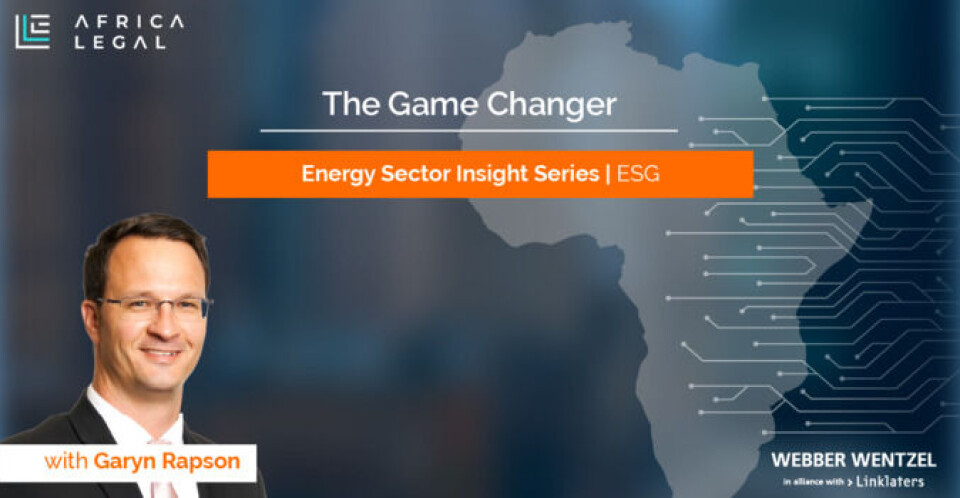Copyright : Re-publication of this article is authorised only in the following circumstances; the writer and Africa Legal are both recognised as the author and the website address www.africa-legal.com and original article link are back linked. Re-publication without both must be preauthorised by contacting editor@africa-legal.com
ESG - The Game-Changer

Garyn Rapson is an environmental law expert at Webber Wentzel. He talks to Craig Sisterson about the growing importance of ESG reporting in Africa.
The combination of advanced laws relating to sustainable development and growing shareholder pressure has seen environmental, social, and governance (ESG) reporting become a vital issue for African businesses, says environmental law expert Garyn Rapson.
“In the last three or four years we’ve seen a strong shift in terms of ESG reporting being a tick box compliance issue where your sustainability manager quickly produces a report at the end of the year, to boards and companies taking ESG standards and performance targets seriously,” adds Rapson, a partner at leading African firm Webber Wentzel. This shift is also marked by the UN driving the Decade of Action, with less than nine years left to realise the Sustainable Development Goals and business now acknowledging that it is not only governments who are responsible for furthering the sustainable development agenda.
Africa is in a unique position, says Rapson: large populations, developing economies, and a “very strong realisation” that, although “we weren’t the ones that caused the problem, we’ll be the ones that bear the brunt of the difficulties around climate change”.
While African businesses may be playing catch-up with some European and American counterparts, a clear understanding from many African governments of the importance of ESG, plus the ability to tap into a wealth of knowledge from an international shareholder base, allows Africa to escalate and elevate its ESG performance quickly and in a manner which addresses its nuanced, jurisdiction-specific challenges, says Rapson.
There’s also another factor that makes ESG an exciting space for Africa, generally.
“African people are entrepreneurial in their approach, so there’s a very clear understanding of the opportunities that ESG presents for Africa,” says Rapson. “We can learn from the mistakes of other jurisdictions and capitalise on the opportunities that ESG presents for Africa, for the betterment of our people and our economy.”
Lawyers can, and have, played an integral part across Africa with ESG understanding and the performance of companies, as well as advising governments on issues like decentralising power and a “key game-changer for Africa” of renewable energy procurement programmes.
While most state-owned energy providers have been slow to diversify out of coal, Africa could have a wealth of things like solar power, wind power, and wave technology, notes Rapson. “I think there was always an appreciation we could tap into that potential, but now governments have taken that head-on across Africa, which is exciting.”
Webber Wentzel has advised various clients on how to diversify their energy, “which has been the biggest driving force in terms of the change in mindset,” he says.
He gives the example of mining companies which would just focus on what they did best (extracting minerals from the ground) but are now thinking about where the power for their operations is coming from, and looking at their power mix and alternatives for power.
When it comes to ESG reporting, as there’s currently no global standardised approach, Rapson and his colleagues advise companies in various sectors across a suite of reporting standards (eg those required by lenders, others by investors, others by supply chains and others which are entirely industry-specific).
Rapson also notes that, while there is great understanding of the E in ESG across Africa, it’s vital that the social and governance aspects of ESG reporting aren’t forgotten. For the S, companies need to consider who works in their operations, how they treat their people, and that they invest in them as well as projects. Companies also need to consider the impacts of their business on people externally (such as host communities and broader society).
“Then obviously G is particularly important,” he says. “We have large-scale corruption, both in government as well as in companies across Africa. So G is going to become incredibly important going forward, and that’s going to be the biggest stumbling block in terms of people taking ESG performance seriously.”
To join Africa Legal's mailing list please click here
